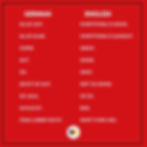How to Use "Wie Geht’s" and How to Respond in German
- Sarah
- May 18, 2022
- 3 min read
Updated: Aug 29, 2023
Did you ever wonder how to say the ever-familiar "Wie geht's?" in German? Whether you are practising your German, starting a conversation with a stranger or just want to be polite, "Wie geht's" is always a good way to start an exchange.
In this post, we show you how and when to use "Wie geht's" and how to respond to it. We also go into the alternatives for "Wie geht's" and as a bonus you will even learn how to say "Wie geht's" in Austria and Switzerland.

When and Where to Use “Wie geht’s”
"How are you" is actually the short form of "Wie geht es" or "Wie geht es Dir/Ihnen". It is used in formal (Ihnen) and informal (Dir) situations, you can use it to start a conversation with anyone you meet.
In English, "How are you" often doesn't require a response, or your conversation partner asks "How are you?" directly back. This confuses many Germans. Depending on where you are in Germany, a more or less long answer is expected, but an answer is always expected. Not answering at all or throwing the question right back at the other person seems confusing at best and rude at worst.
Germans from the north of the country tend to give a more detailed answer to the question "How are you?" than people from the south of Germany, where answers are kept short and simple.
How do you answer "Wie geht's"?
You can respond to "Wie geht's" with a few words or tell your conversation partner all about your day. It is common and even expected to respond to each answer with "und dir/Ihnen?" (what about you?) or with "and selbst?" How do you answer "Wie geht's"?
You can respond to "Wie geht's" with a few words or tell your conversation partner all about your day. It is common and even expected to respond to each answer with "und dir/Ihnen?" (what about you?) or with "and yourself?" (and yourself?).
Be prepared for your interviewer to tell you something about themselves for a minute or two. The shorter your answer, the more you show your interviewer that you don't feel like talking.
If you don't want to give much away, you can simply respond with "Gut. Und dir?" which will quickly end that part of the conversation.

Alternatives to "How are you?
Depending on where you live and the demographic you're dealing with, there are a number of alternatives to "Wie geht's" that you'll hear frequently. They are all informal, so don't use them in a formal business setting. Was läuft?” and “Was geht ab?” are most commonly used by young people.

How do you say "Wie geht's" in Austria and Switzerland?
If you are in Austria, you will most often hear "Wie hat's di" to say "Wie geht's" in German. In Switzerland, there are a number of funny variations like "Wie gaht's", "Wie gohts" or "Wiä häsches". Pick the one that is easiest for you to pronounce and go with that.
Conclusion
No matter what conversation starter you use, it is always polite to ask someone how they are doing. If you don't dare to have long conversations with strangers, it's actually unlikely to happen. Most Germans are busy, somewhat introverted and will not hold long monologues. You are more likely to have a pleasant, short and nice interaction if you ask someone how it goes. So give it a try! Viel Glück!
Read more blogs!

